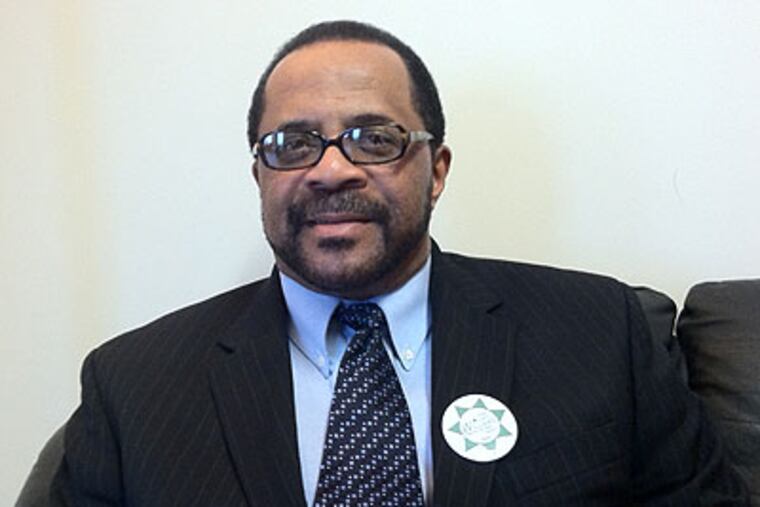Warrant unit transfer to Sheriff's Office draws concern
An agreement has quietly been ironed out to shift the city courts' 47 "warrant officers" to the Sheriff's Office, and not everyone is happy about it.

An agreement has quietly been ironed out to shift the city courts' 47 "warrant officers" to the Sheriff's Office, and not everyone is happy about it.
The warrant unit, created in 1972 to enforce court orders and encourage voluntary surrenders, tracks down criminal defendants and manages people under electronic monitoring. Its officers are firearms-trained and carry 9mm pistols. They can enter private property in their hunt for people who skip out on court appearances.
It can be dangerous work. In 2004, warrant unit officer Joseph E. LeClaire Jr. was killed while serving an arrest warrant in an East Germantown apartment.
The administrative judge of Common Pleas Court, John W. Herron, and Sheriff Jewell Williams have decided that for now, the unit belongs under the sheriff. In July, they signed a temporary agreement that made warrant unit officers sworn sheriff's deputies.
That transfer has now come under fire from the local Fraternal Order of Police president, John McNesby, who maintains that anyone acting as a deputy sheriff must be in the union - which the court's warrant officers are not.
After The Inquirer showed McNesby a copy of Herron's and Williams' agreement, he said the FOP would file a complaint with the state labor board that the two offices "failed to bargain" with the union.
McNesby says the sheriff cannot appoint just anyone a deputy sheriff. He said the 200-plus sworn deputies are civil service and unionized.
"They can't just do the sign of the cross and deputize someone," he said.
In Philadelphia, deputy sheriffs' primary duties are guarding courtrooms, moving prisoners to and from court, and selling properties at monthly sheriff's sales. The Sheriff's Office, with 289 employees, also has its own 30-member warrant unit.
The Inquirer, through a Right to Know Law request, obtained a copy of the one-page "preliminary memorandum of understanding" that Herron and Williams signed in July and that expires in 2016. The document says both offices aim to work out "a permanent agreement without delay," but is thin on details.
It says the court system is responsible for warrant unit salaries - $41,000 to $46,000 - while the sheriff decides working hours and assignment locations.
Less clear is whether warrant unit officers will have to change the way they have done business for 40 years:
Since they are now deputies, they could be assigned any sheriff duties and have less time for arresting people on warrants - though that hasn't happened.
They still wear uniforms and drive vehicles issued by the courts, not the Sheriff's Office.
The officers, who had firearms training while still part of the court system, had to undergo a new round of such training, complete with certificates signed by the sheriff - except those 90-day certificates have expired, leaving some officers worried about their legal status if they have to use their guns.
Herron and Williams have not responded to multiple requests for comment about their agreement.
Apart from the move to the Sheriff's Department, the legitimacy of the warrant unit has also been questioned by the Public Defender's Office, which says the officers have no legal authority to stop and arrest people.
"The issue has come up time and time again," said Bradley Bridge, an attorney in the defender's office, who said that office takes no position on the sheriff issue. "Our issue is, whatever process you have, we want it to be legal," he said.
Deputy Court Administrator Richard McSorley said last month that a key concern is that the officers may be assigned tasks such as working at sheriff's sales or securing the Family Court building.
"We want to make sure these criminal warrants are a high priority," McSorley said. "That's why we have a designated unit."
At any given time, there are about 38,000 outstanding misdemeanor and felony warrants in the city. In 2013, the courts' warrant unit cleared 8,967 of those warrants, according to officials' budget testimony.
Since the unit moved to the sheriff, warrant officers, speaking on condition of anonymity, say other duties have cut into their arrest rate. Court officials have not replied to requests for arrest data.
The deputy mayor for public safety, Everett Gillison - who has been working with the Sheriff's Office and the court to work out the deal and is involved because the city's budget includes both offices - declined comment.
Mayor Nutter's spokesman, Mark McDonald, said of the matter: "It is not ripe for discussion."